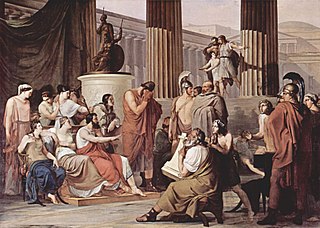Related Research Articles
In Greek mythology, Proetus may refer to the following personages:
In Greek mythology, Minyas was the founder of Orchomenus, Boeotia.
The name Nausithous is shared by the following characters in Greek mythology:

In Greek mythology, Alcinous was a son of Nausithous and brother of Rhexenor. After the latter's death, he married his brother's daughter Arete who bore him Nausicaa, Halius, Clytoneus and Laodamas. In some accounts, Alcinous' father was Phaeax, son of Poseidon and Corcyra, and brother of Locrus.
In Greek mythology, Alcimede was one of the matrilineal Minyan daughters, the daughter of Clymene, Minyas' daughter.
In Greek mythology, Phylacus was the name of the following figures:

In Greek mythology, Sinope was one of the daughters of Asopus and thought to be an eponym of the city Sinope on the Black Sea.
Actor is a very common name in Greek mythology. Here is a selection of characters that share this name :
In Greek mythology, Metope may refer to the following:
In Greek mythology, Demonassa or Demonassae was a name attributed to five women.
In Greek mythology, the name Eurydamas may refer to:
In Greek mythology, Amphissa may refer to the following personages:
Deïmachus may refer to several figures in Greek mythology:
In Greek mythology, the name Clymene or Klymene may refer to:
Eurytion or Eurythion was a king of Phthia. He was also counted among the Argonauts and the Calydonian hunters. The writer Tzetzes called Eurytion as Eurytus.
In Greek mythology, Irus or Iros may refer to two individuals:
In Greek mythology, Argus or Argos may refer to the following personages
In Greek mythology, Clytoneus or Clytonaeus may refer to two different individuals:
In Greek mythology, Theognete was the daughter of Laodicus. By Aeson, King of Iolcus, she was the mother of Jason and possibly Promachus.
In Greek mythology, Stratius or Stratios may refer to three distinct figures:
References
- Apollonius Rhodius, Argonautica translated by Robert Cooper Seaton (1853-1915), R. C. Loeb Classical Library Volume 001. London, William Heinemann Ltd, 1912. Online version at the Topos Text Project.
- Apollonius Rhodius, Argonautica. George W. Mooney. London. Longmans, Green. 1912. Greek text available at the Perseus Digital Library.
- Homer, The Odyssey with an English Translation by A.T. Murray, Ph.D. in two volumes. Cambridge, MA., Harvard University Press; London, William Heinemann, Ltd. 1919. ISBN 978-0674995611. Online version at the Perseus Digital Library. Greek text available from the same website.